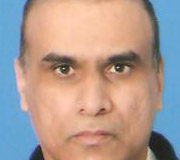The Tribune: Mediocrity on the field, shame off it
Share
Mediocrity on the field, shame off it
Vaibhav Sharma
Tribune News Service
It is hard to get to the top and even harder to stay there. But the toughest job of all is to claw back to the pinnacle once you have been pushed off the perch. There is something psychologically draining about stavrting all over again. Need a stark example? Welcome to the world of Indian hockey.
Winner of eight Olympic gold medals, one World Cup, two Asian Games golds and two Asia Cups, the team today struggles to find a foothold every time it enters the field, and issues off it do not help. The captain has a problem with the foreign coach, the striker with the captain and everybody has a problem with the federation.
The year started on a pretty disastrous note with the controversy of player payments hitting the sport. Around just the second week of January, while the team was in Pune for the World Cup preparatory camp, the players came out in the media alleging non-payment of their dues by Hockey India (HI).
The players then turned down an offer of Rs 25,000 each from HI, went on strike and it seemed like they would face a ban from the World Cup. But better sense prevailed ultimately. Still, the sentiments of the players could aptly be described in Deepak Thakur’s words. “Nothing comes before the nation, not even money. But why is it that only the players have to think about the nation and not the administrators? We have an important event round the corner and that’s why we raised the issue now. Had we raised it earlier, it would have been swept under the carpet,” Thakur had said after the timing of the strike had led to allegations about the players being greedy.
It seemed then that the issues had been sorted out and the nation was set to embrace the World Cup with arms open. But just about a week before the tournament, a charity event was lined up in Chandigarh, which would have seen the team play a match against some celebrities. The event was ultimately cancelled with the organisers claiming that the players had demanded Rs 5 crore to participate. The controversy was later hushed up, but the damage had been done and players, who had looked like crusaders till a few days ago, were turned into mercenary bloodsuckers.
Finally, on-field action took centre-stage and the World Cup began in New Delhi. The tournament got underway with the ‘Mother of all Games’ on Day 1– India taking on Pakistan. The match was being billed as the acid test, the one that would decide the course of India’s campaign.
It started perfectly, with the hosts beating Pakistan a convincing 4-1. But that was about the only thing that went right for them. They lost 2-5 to Australia and by the same margin to Spain. Then in a do-or-die match against England, they lost 2-3 and were also held 3-3 by South Africa. It was an utterly dismal campaign which was rounded up in worse fashion as India lost to Argentina 2-4 in the seventh-eighth place play-off.
It is also important to mention that just before the World Cup, a captaincy controversy had hit the team. While Spanish coach Jose Brasa was believed to be backing Prabhjot Singh, Hockey India stuck to Rajpal Singh, fuelling reports of a massive rift within the side.
The men’s team moved on and the next notable tournament for them was the Sultan Azlan Shah Cup in Malaysia. The meet brought a little cheer to the demoralised looking side as they were declared joint winners, alongside South Korea, after a rain-hit final. This was followed by the four-nation Hamburg Masters, and it was looking like that action was finally shifting to the field. Or so one would have thought.
In July, Indian women’s hockey sent out another shockwave as the team was engulfed in an alleged sex scandal. The videographer was sacked, the chief coach MK Kaushik was rounded up and he ultimately made his exit.
After so much turmoil, and the general pessimism around the Commonwealth Games, to expect anything for the sport was looking like sheer waste of time. Nonetheless, the Games went off in superb fashion, and the men’s team, which had never won a medal at these Games, won their first, a silver, losing to Australia in the final. The women’s team, however, could not match their 2006 silver and went out without a medal.
At the Asian Games in the following month, the men’s team had to settle for a bronze after losing to a unfancied Malaysia in the semi-final.
Soon after, Rajpal resigned, hit out at coach Brasa and opened another can of worms when the two medals were seemingly working as a balm.
It has been quite a year for the sport, and for the sake of National honour, people’s love for hockey and its position as the National game, let’s hope the news in 2011 is all made on the field. Win or lose, the teams should with heads held high, knowing that they gave it their all.


